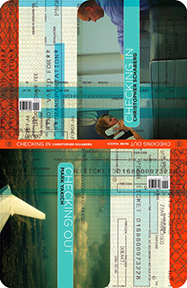All around me is the snap, crackle, pop, sigh, hiss, shloop, and swoosh of air. In this airplane, I’m vacuum-sealed like packaged meat, yet air moves all around me. Changing places. Over water and land, keeping us aloft.
We are above ten thousand feet, so the flight attendants begin serving refreshments: carbonated juices and soft drinks, airtight bags of miniature pretzels. I order a ginger ale, which once snapped open is poured into a plastic cup with ice. The froth is golden and nearly bubbles over the cup’s rim. Liz, my girlfriend, has a window seat, so I pass her a cup of cran-apple juice given to me by the flight attendant. Air from the fan over Liz’s head ripples her cream blouse, but doesn’t touch her hair—she has angled the nozzle downward. The pilot or copilot’s voice is heard on the PA. He warns about possible turbulence. A pocket of air forms in my stomach as he says this, and I squeeze Liz’s hand. Her eyes are closed and her breathing soft, but I know she is not sleeping.
Even when we are sleeping, we exchange air. We are involuntary breathers, allowing us to sleep or be knocked unconscious without dying. Whales, dolphins, and porpoises, on the other hand, are voluntary breathers, meaning they must consciously be aware of every breath they take: rising to the surface to breathe through their blowholes. For this reason, these creatures can only sleep in stages, resting one-half of their brain at a time.
Because we don’t have to think about every breath we take, most of us pay little attention to the crucial role air exchange plays in our survival. It seems rather obvious, doesn’t it? That we need air to survive. But too often, the most obvious experiences, those occasions of reflex, aren’t given enough thought.
I’m on a flight from Florida, where I spent a week with Liz and some close friends soaking up the sun in March, breathing deeply the warm air in hopes that it would stay inside of us when we returned home to a chilly Northern Virginia. During our stay, we did some touristy things. We spent a lot of time at the beach observing sea creatures. On Sanibel Island in Southwest Florida, we swam with the dolphins. There must have been a dozen or so within thirty yards of the shore, and many beachgoers, including us, waded up to our knees to better see the wild animals. They were so close I could hear them breathe when they reached the surface, their inhale and exhale in one, rushing sound. Dolphins, like whales and humans, are mammals. We breathe using our lungs. We rely on the exchange of air for survival.
After spending this time with the dolphins, you could say that my senses were awakened to things that typically went unnoticed. For instance, I started to think an awful lot about air. How it moves and where it goes. I became interested not in the science per se, but the concept. I became curious about air the same way that I’m curious about where I fit into this life, in history, on a plane. And, never before, did air appear so much around me.
I was on an airplane that had left from an airport, and we were coursing through the air. My seat cushion was filled with air: it could be used as a floatation device in case we had a water landing. There was air in my drink: some of it had gone down my throat into my stomach while other air escaped with a hiss. Air was blowing from a nozzle above our heads: I could twist this nozzle to the right and shut off this air or I could twist it to the left and increase it. There was air between the pages of Liz’s paperback. When the pages stuck, additional air would be required to reduce the paper-on-paper friction. A lick of the finger. Air in my saliva. Air in my lungs. There is that uncomfortable feeling, often on a plane, when the air upon which you are sitting is exchanged. Your bottom drops out only to be supported in a fraction of a second by newer air. The exchange of air pops ears.
When we fly, we exist in a homeostatic state. The air pumped inside—smuggled in bags of pretzels and cans of pop—must be equal to the air flowing around us. The air blocked by double-paned windows and fiberglass. It is this equilibrium that keeps us alive. And no more than in an airplane, twenty thousand feet above sea level, do I feel like a mechanism, a breathing apparatus. I exist for one purpose: to exchange oxygen with carbon dioxide. Doing my part to keep the world in balance.
Merrill Sunderland is an MFA candidate at George Mason University in Fairfax, Virginia. He is originally from Cape Cod, Massachusetts, and enjoys writing about all the quirky things that happen in life.






